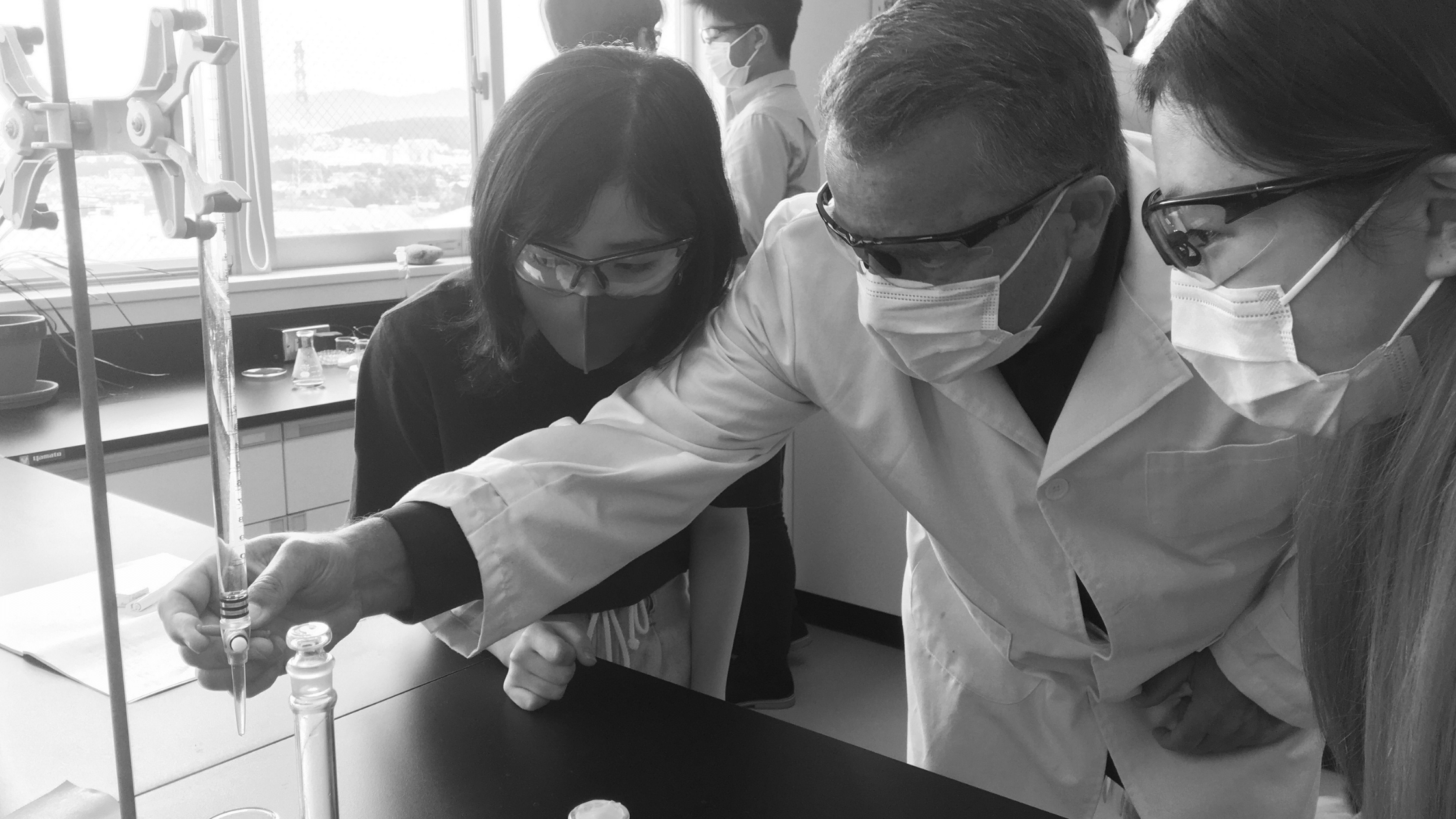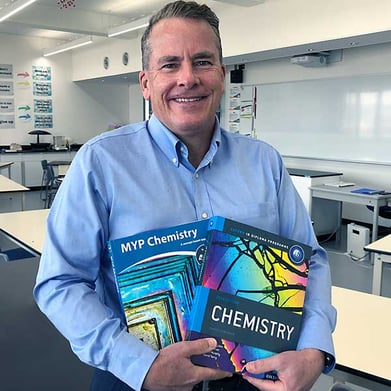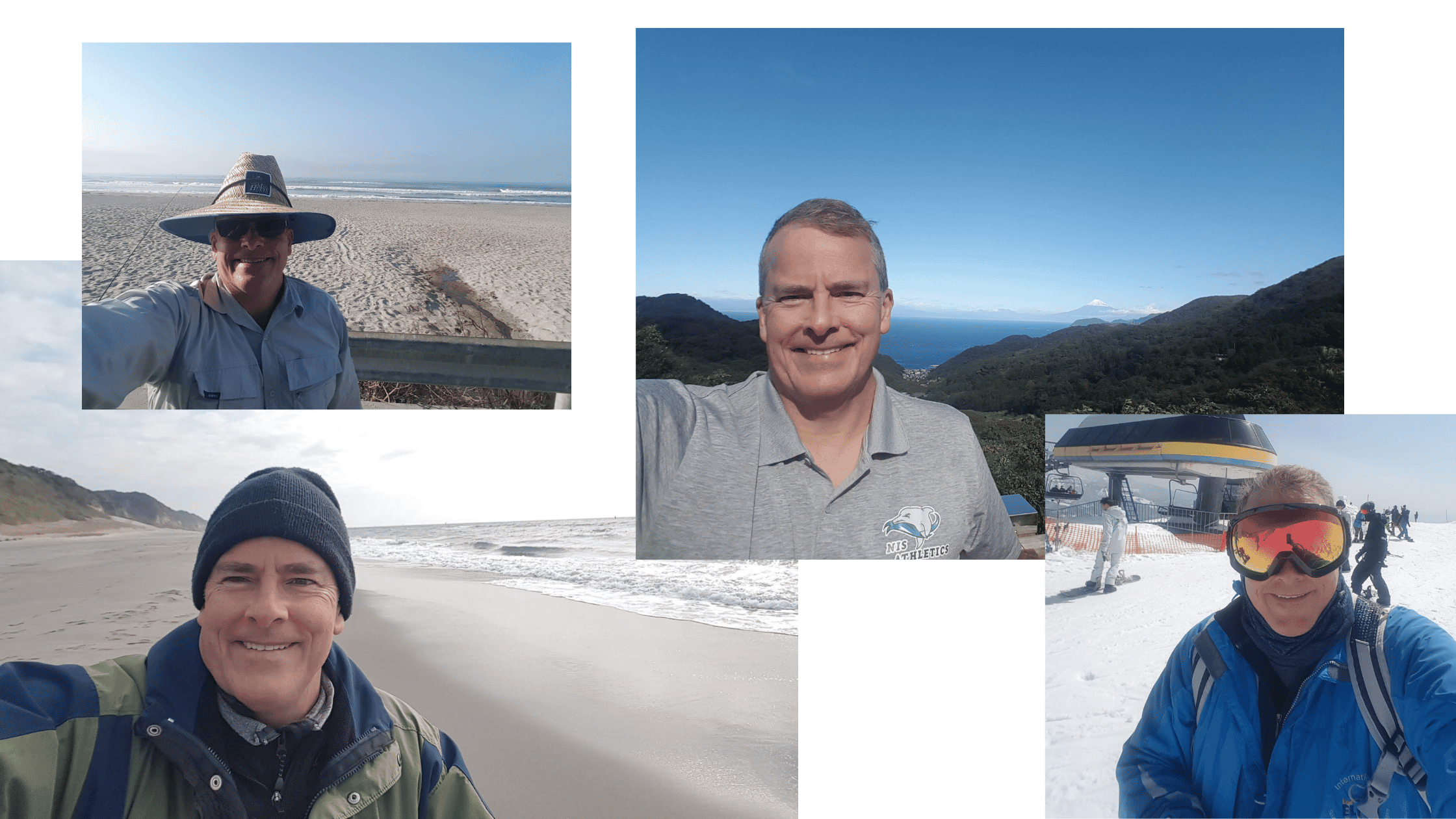 NIS is fortunate to have several IB consultants, evaluators, and curriculum developers on staff at NIS. Gary Horner, our Department Learning Leader of Science is one of them. Gary has written curriculum documents, handbooks, and textbooks for the IB organization over his long career as a teacher in three countries, including Switzerland at the International School of Geneva, the birthplace of the IB curriculum. His expertise in Chemistry and the IB is a true asset for the students at NIS. Please read more about Gary and his journey as a chemistry and science teacher, an IB leader, and someone who is always looking for an adventure!
NIS is fortunate to have several IB consultants, evaluators, and curriculum developers on staff at NIS. Gary Horner, our Department Learning Leader of Science is one of them. Gary has written curriculum documents, handbooks, and textbooks for the IB organization over his long career as a teacher in three countries, including Switzerland at the International School of Geneva, the birthplace of the IB curriculum. His expertise in Chemistry and the IB is a true asset for the students at NIS. Please read more about Gary and his journey as a chemistry and science teacher, an IB leader, and someone who is always looking for an adventure!
What is your role/what do you teach at NIS?
I am the DLL of Science or Head of the department, and I also teach IB Chemistry and MYP Science.
Tell us about your path to becoming a teacher...
Well, it is quite a long story… The short version is that at university, I trained to be a research chemist. At the time, there was a lot of unemployment in the science field due to government policies (editor’s note: Gary is from Australia), and so it was difficult to find a good job in the field that I wanted to go into. So I went to consult with the Dean of Science at my university, and he remarked that he had seen me give a tutorial to a group of students in my fourth year. The Dean told me that he was impressed with my teaching skills and suggested I consider teaching. At the time, I hadn’t ever considered teaching as a career, even though I had some very inspirational teachers when I was in high school. And so I went to visit the education department and I applied. I really loved it and very much enjoyed doing my practical teaching. I even graduated at the top of my class. So, as they say, the rest is history…
How long have you lived in Japan?
I started traveling to Japan in 1992 and had been to Japan on holidays around 10 or more times before I came to live here. Back then, if you flew Japan Airlines to Europe, you’d fly from Brisbane to Narita, and they would give you free nights accommodation at the Nikko Narita hotel before heading on to your ultimate destination. The first time I did this, I took a stroll in downtown Narita City and fell in love with the country. I then started flying here, traveling around on the Japan Rail Pass, staying in youth hostels, and falling in love with the local people, the culture and the country.
Where else have you taught? How did that (did those) differ from NIS?
I’ve been teaching overseas for 22 years. I love to travel, and when I was teaching in Australia, I used to take my summer holidays and travel to Europe. There I really got into skiing. So I would travel around a lot, and someone I worked with in Australia suggested that since I like traveling so much, I should get into the international teaching circuit, and here I am. My first experience was in Lausanne, Switzerland, where classrooms were in traditional Swiss chalets, and my laboratory was originally the kitchen in the basement of what used to be a wealthy person’s home! That school was a couple of hundred students, relatively small. My first IB Chemistry class had two students. I then went to the International School of Geneva (the home of the IB) with over 4,500 students on three campuses, so quite a significant change! From there, I went to Hong Kong for ten years to another big school of 1800 students from grades 7-12. I came to Japan from Hong Kong and have been at NIS for six years.
I’m also heavily involved in the IB organization. I’m a senior examiner and part of a small team that decides on grade boundaries for chemistry exams. I lead a lot of workshops and work with teachers who are new to the IB community. Previous to COVID, I would frequently travel around Asia, but now it is all virtual. I’m also a field representative for the IB, where we look at quality control during the workshops, so I observe the other workshop leaders and give them suggestions and feedback. I also do various curriculum development work, developing handbooks and curriculum documents, and textbooks for teachers to follow as they teach chemistry. I became involved in the role of an examiner when I was in Geneva, inspired by the many principal examiners who worked there. I always encourage my colleagues to get involved in examiner work as it is an excellent professional development tool. Being an examiner influences my teaching every day.
What’s the best thing about being a teacher?
This is a hard question to answer, but I think it is the variety. I like to do many different things, and every lesson is different. It doesn’t matter if you’ve taught that lesson 100 times. The students, their approaches to learning, the way they respond to questions, their rate of development of their understanding of the concepts make each class and experience different. When you are teaching, it is like you have 20 individual lessons going on at the same time. Great variety. I also like the autonomy of being a teacher. I get to decide how the lessons are structured, and I enjoy this challenge. And the holidays are not too bad as well.
What is one of your passions or interests? What do you do outside of school?
I really like to travel, and this is one of my passions. I suspect travel will remain challenging due to COVID for a while. I like sports, and I’m a very keen golfer. I’ve been playing golf since I was a young boy. I also love to ski, and this winter has been exceptional.

What’s one thing you’d like your students to really understand?
I think this is a good question. I’ve taught for more than 30 years now, and often teachers will say that students are all the same. But the generations I have taught have gone through a lot of change, and I think the current generation and what they face, the world in which they are growing up, and the different pressures on them are vastly different from what the students were dealing with 30 years ago. And they have other challenges. I mean this in the nicest possible way, if I could, I’d teach students not to have a sense of entitlement for either success or jobs or acquiring material “things”. I feel that with the influence of social media - what is often being messaged is that you can get everything you want right away. I believe that it takes time and hard work to achieve your goals in life. To aspire to achieve your goals is great but you have to have realistic aspirations. When the goals or timelines are unrealistic, this is when anxiety will set in and this can be very destructive. Though they don’t always see themselves as such, I try to show them that as a student in an international school, they are in a privileged position. I try to impress on them that they should try to “pay it forward” and to return something to their community if they can. Make a difference as you journey through life!
What are you reading right now?
Ian Rankin has a series of detective novels about a Scottish detective called Rebus. I’m quite into that now.
What’s your favorite place in Japan?
It depends on the season…in the winter, it would be anywhere I can ski. Spring and Autumn - probably a golf course somewhere. I like nature, and since I really like to travel, I enjoy going to a small village, where I may be the only foreigner, and get a glimpse of everyday life. I’m a real people watcher and sometimes I will just take a day trip to a local village and enjoy the culture of the area and what everyday life looks like there.
What’s your favorite food in Japan?
Ah, that’s an easy one…sushi!
Last words?
I didn’t imagine I’d be here for six years. NIS is a special school. It has a warm feel to it, and I have felt very welcome and valued. I think it is done well at the school - people value what you do. And the students are lovely!

 NIS is fortunate to have several IB consultants, evaluators, and curriculum developers on staff at NIS. Gary Horner, our Department Learning Leader of Science is one of them. Gary has written curriculum documents, handbooks, and textbooks for the IB organization over his long career as a teacher in three countries, including Switzerland at the International School of Geneva, the birthplace of the IB curriculum. His expertise in Chemistry and the IB is a true asset for the students at NIS. Please read more about Gary and his journey as a chemistry and science teacher, an IB leader, and someone who is always looking for an adventure!
NIS is fortunate to have several IB consultants, evaluators, and curriculum developers on staff at NIS. Gary Horner, our Department Learning Leader of Science is one of them. Gary has written curriculum documents, handbooks, and textbooks for the IB organization over his long career as a teacher in three countries, including Switzerland at the International School of Geneva, the birthplace of the IB curriculum. His expertise in Chemistry and the IB is a true asset for the students at NIS. Please read more about Gary and his journey as a chemistry and science teacher, an IB leader, and someone who is always looking for an adventure!
